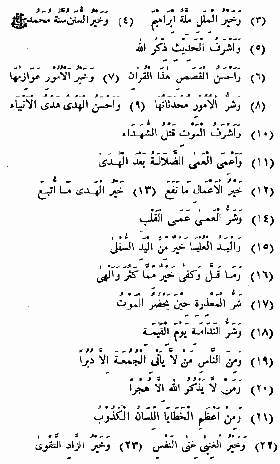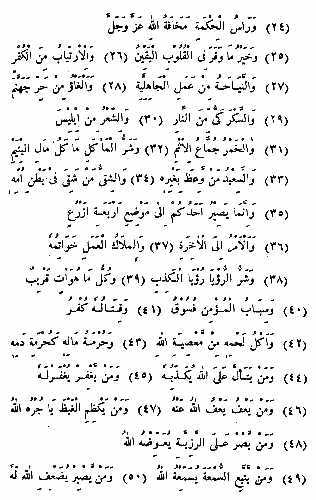The Friday Prayer
Prescribed Procedure for Delivering
the Sermon
To print this
file in pdf format click here
We acknowledge and thank Islamic Publications
(Pvt.) Ltd. for permission to reproduce this excerpt from Everyday
Fiqh, Vol. 1, by Abdul Aziz Kamal
The Khatib (preacher), after attaining necessary purity, should
take his place on the pulpit facing the audience and the Mu'azzin
should pronounce the Azan facing him. As soon as the Azan
is over, the Khatib should stand up on the pulpit and after reciting
Ta'awwuz
inaudibly, should start delivering the Sermon in a loud voice.
First of all, he should glorify Allah Almighty, then bear witness to
His Unity and Prophethood of the Holy Prophet Muhammad, and then instruct
the audience in religion briefly in a dignified and spirited manner.(1)
After this he should sit down and observe a short pause. (2)
Then he should stand up again for the second sermon, in which he should
glorify Allah and bear witness again, recite a few verses of the Qur'an
and invoke Allah's blessings for the Holy Prophet and pray for his Companions,
especially for the rightly-guided Caliphs, Hadrat Hamzah and Hadrat 'Abbas,
and last of all for the Muslim people of the world, and then bring the
sermon to completion. Immediately after that he should stand up for the
prayer.
Sermons of the Holy Prophet
Some portions of the Sermons delivered by the Holy Prophet have been
preserved in the Hadith Collections. A perusal of these will show that
they were beautifully worded, comprehensive, brief, effective and forceful
in style. Below we give a specimen along with its translation for the benefit
of preachers :
A Comprehensive Sermon of Tabuk Campaign
After glorifying Allah the Holy Prophet said:
After this he prayed for Allah's forgiveness thrice and brought the
Sermon to conclusion.
Translation:
1. The most truthful of discourses is the Book of Allah.
2. The most trustworthy word is Taqva (fear of God).
3. The best of the communities is the Community of Prophet Abraham
(Allah's peace be upon him).
4. The best way of life is the Sunnah of Prophet Muhammad (Allah's
peace be upon him).
5. Remembrance of Allah is the most glorious of all things.
6. The best of all narrations is the Qur'an.
7. The best acts are those requiring the highest degree of will and
determination.
8. The worst acts are those based on innovation.
9. The best way of life is the one adopted by the Prophets of Allah.
10. The most glorious death is the death of the martyr.
11. The most wretched blindness consists in going astray after finding
the Right Way.
12. The best of acts is the one that yields benefit.
13. The beat guidance is that which the people may be able to follow.
14. The worst blindness is the blindness of the heart.
15. The upper hand is better than the lower one.
16. The less which can meet one's needs is better than the more which
can cause neglectfulness.
17. The worst excuse is that which is offered at the point of death.
18. The worst remorse is the remorse of the Day of Judgment.
19. Some people come for the Friday Prayer but their hearts are held
up behind.
20. And they are able to remember Allah but little.
21. The sin of the lying tongue is the gravest of all sins.
22. Real richness is the richness of the heart.
23. The best provision is the provision of Taqva (fear of God).
24. The best of all wisdom and knowledge is the fear of Allah Almighty.
25. Faith is the best thing to be cultivated and entrenched in the
heart.
26. Doubt and vacillation are an index of unbelief.
27. Wailing over the dead is a practice of ignorance.
28. Stealing and embezzlement are the provision for Hell.
29. Getting drunk is to burn in the fire.
30. (Nonsense) versification is satanic.
31. Drinking is the source of all evil.
32. The worst that one can eat is the property of the orphan.
33. Fortunate is he who learns from the mistakes of others.
34. Wretched is he who is wretched by birth.
35. And each one of you is to be buried deep under the soil.
36. And the deeds of each one will be judged in the Hereafter.
37. An act is judged by its fruit.
38. The worst dream is the false dream.
39. That which is approaching ia very near.
40. Abusing a believer is sinful.
41. And fighting a believer is a sign of disbelief.
42. Backbiting a believer is disobedience of Allah.
43. A believer's property is as unlawful for the other person as his
blood.
44. The one who is indifferent to Allah is ignored by Allah.
45. Allah keeps the secrets of him who keeps the secrets of others.
46. The one who forgives others is forgiven by Allah.
47. He who suppresses his anger is rewarded by Allah.
48. He who endures a loss with patience is rewarded by Allah.
49. The habitual fault-finder is disgraced by Allah.
50. Allah multiplies the rewards of him who adopts the attitude of
patience.
51. And the one who adopts the attitude of disobedience is chastised
by Allah.
Notes
1. According to a tradition in Sahih Muslim,
when the Holy Prophet gave the sermon his voice would rise and his eyes
would become red with the intensity of feeling, and it appeared as if he
was warning his audience against the enemy who was about to attack them.
2. For long as one may recite Subhan-Allah
thrice
Everyday
Fiqh (Vol.1) by Abdul Aziz Kamal ©1986 published by Islamic
Publications (Pvt.) Ltd., 13-E Shah Alam Market, Lahore, Pakistan
|


